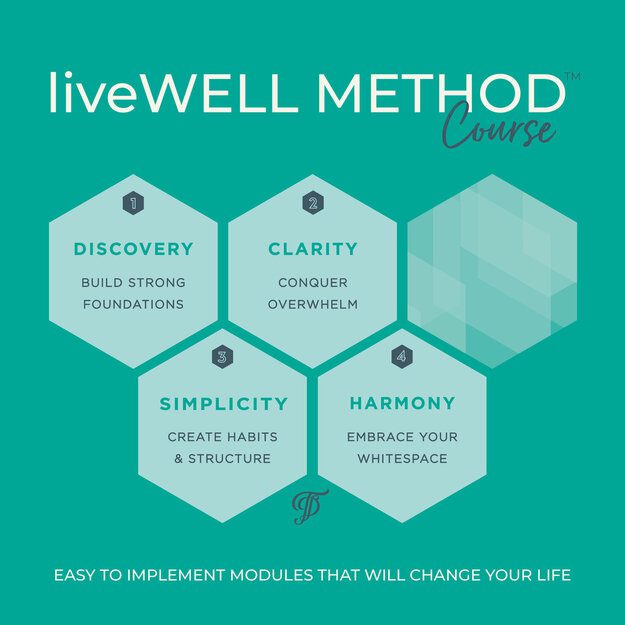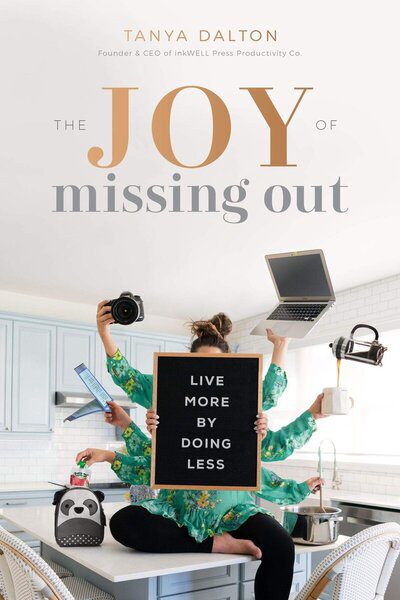Print | Kindle(eBook) | Audiobook
JOMO: An intense feeling of delight and happiness caused by centering your life on what is truly important and letting go of the “shoulds” and “have tos” in life.
In Joy of Missing Out (JOMO), Author Tanya Dalton argues that we don’t have to do a million things to be productive, re-ordering our priorities enables us to live life more intentionally. According to Tanya:

Real productivity helps us know where to start. It’s intentionally choosing to cut through the clutter and noise in our lives. It’s discovering the happiness that comes when we center our lives on what is truly important to us and let go of the rest—it’s the joy of missing out.
JOMO – The emotionally intelligent antidote to busy; intentionally choosing to live in the present moment by embracing open spaces of unrushed time.
“PRODUCTIVITY IS NOT ABOUT doing more, IT’S DOING WHAT’S MOST IMPORTANT”
The LiveWELL Method
The liveWELL Method is a series of small, huge movements: easy to manage and simple to implement, yet monumental in the impact they make on your daily life. In its most basic form, the liveWELL Method will help you design a life centered around your priorities. The four-step process will help you customize systems and strategies and design them to work for you.

DISCOVERY: Because you are at the center—not the system—we begin by working together to discover your unique purpose and identify the priorities in your life. We will create a North Star to serve as your personal guide to help you make choices and begin to focus on what’s important.
CLARITY: Using what we discovered in step one, we will learn how to choose the projects and tasks that will have the most impact on your goals and priorities. We will create effective boundaries and learn an easy framework to help clarify what is important and what is not.
SIMPLICITY: Even while living a priority-centered life, you still have all those not-so-glamorous tasks to accomplish—from home chores to finances. We will work together to simplify these systems and design personalized processes to help both your work and home life run with less effort.
HARMONY: Now that we have discovered your purpose, clarified what’s important to you, and built a solid foundation of simplified systems to help things run smoothly, we will work to pull it all together and create harmony so you can begin living a life you love.
“When you are productive, you place your priorities at the front and center of each and every day. And when your priorities are the focus, you can finally enjoy the whitespace—you can allow yourself to slow down and embrace the calm.”
Self-Limiting Beliefs
Why do we have these limiting beliefs, and where did they start? There is a point in our lives where we seem to go from confident to questioning—from being assertive and sure to hesitant and uncertain. For many of us, there’s a tiny little blip on our life maps, somewhere between elementary school and high school, where we lost our self-assurance in who we are.
Ask any kindergartner what they are good at, and you’ll need to sit through a laundry list of topics: art, running, painting, climbing trees, eating potato chips—seriously, five-year-olds think they are amazing at everything! But wait ten years and ask the very same child, and she’ll think of almost nothing; at best you’ll maybe hear one or two things she believes she excels in. What happens to us in this space of time? How do we lose our belief in ourselves? We’ve allowed the world to define us and reinforce these limiting beliefs, but it’s time to breakthrough.
We are all lucky enough to be on this earth for a finite amount of time—it’s up to us to maximize that time and live our lives to the fullest. Living a life with our priorities guiding us is the key to a happy life—a life that feels well lived.
Time, Energy and Focus
We all have three key resources available to share with the world—time, energy, and focus. Each of these elements, though, is a depleting commodity; once it’s invested, it’s gone forever. You cannot get it back. By far, these are the most valuable resources we have to give. But in an effort to make our buckets feel like they are somewhat even, we spread these resources out far and wide, making little to no impact. We end up stretching ourselves thin, exhausting ourselves.
When we get caught up in the idea of balance, we are busy trying to make everything even. We don’t concentrate our time, energy, and focus to move in the direction we really want to go. In chasing this illusion of balance, we end up creating a life that feels busy—not meaningful. We have to be willing to go out of balance. We need to be willing not to do everything. That’s the real magic.
Time doesn’t stop. It’s finite, and we have to treat it as such when it comes to our priorities and our vision of where we want to be. You have more time left in your life right now in this very minute than you will have an hour from now. There is not another point in your lifetime when you’ll have the luxury of the amount of time you have right this very second.
Locus of Control
When we gift ourselves with the ability to step back and choose, something powerful begins to happen. We strengthen our internal locus of control3. In other words, we remember we have the ability to influence our own destiny instead of allowing the current to push us wherever it wants.
People with a strong internal locus of control believe they have the freedom and ability to make their own choices and determine what happens to them. Because of that, they are significantly happier and more motivated. Psychologists have found that an “internal locus of control has been linked with academic success . . . higher self-motivation and social maturity . . . lower incidences of stress and depression . . . and longer life span. We want to strengthen our internal locus of control and begin to understand that we have choices.
Finding choices isn’t only possible, it’s essential to thrive. You just have to start actively looking for them—that’s a choice in and of itself.
Effective vs Efficient
Productivity isn’t about being efficient—it’s not about filling our day with tasks to quickly check off. It’s about being effective and asking yourself if those tasks need to be done at all. I want to remind you: productivity is not getting more done—it’s focusing on what matters most.
Unfortunately, when people focus on being efficient, the resource we target is time. We fail to realize that being efficient is about getting things done; being effective is getting what’s important done. There’s a big difference.
DOING, DREAMING, AND DEFINING
Our North Star is a combination of our mission, vision statement, and core values. Each one answers the question of who you are at your heart. The mission statement tells us what we are doing now, the vision statement tells of where we want to be, and the core values tell us how these can be defined through our actions. Like pieces of a puzzle, they come together to create the completed picture of why we make the choices we do. They become the North Star we need to guide us and help us navigate through decisions.
CLEAR Framework
Important tasks are hard to define. The CLEAR framework helps you differentiate the important from the merely urgent:
- Connected to your North Star
- Linked to a goal
- Essential
- Advantageous
- Reality-Based
Connected to your North Star
“ASK YOURSELF: IS THIS CONNECTED TO MY NORTH STAR?”
Your North Star determines how you want to spend your time, energy, and focus—the three key commodities when it comes to productivity. It can also help clarify what’s important.
ASK YOURSELF: IS IT LINKED TO A GOAL?
“The big secret in life is that there is no big secret. Whatever your goal, you can get there if you’re willing to work.” – Oprah Winfrey
ASK YOURSELF: IS IT ESSENTIAL?
If you allow it, work will fill all your time 24 hours a day, 365 days a year. Parkinson’s law applies to all of us regardless of fame or fortune.
“The difference between successful people and really successful people is that really successful people say no to almost everything.” – Warren Buffet
ASK YOURSELF: IS IT ADVANTAGEOUS?
We want to consistently work on tasks that have a return on investment—the time we put into them pays off in dividends down the road. Our time is a finite commodity that we are consistently investing in the tasks and chores we choose to do, so you need to question how you are spending this time.
ASK YOURSELF: IS IT REALITY-BASED?
Oftentimes we feel that something is important because we believe it’s something we are supposed to do—even if it’s not something we really want. These tasks are so deeply entwined with our stories and our need for perfection that we don’t even realize it. We feel tied to the obligation, and we lose sight of why we are even doing the task in the first place.
Create Systems
Systems are a key part of living the life we want, because while it’s important to spend time focused on priorities, we still have all the other tasks to do. There are the not-so-glamorous activities like home maintenance, managing finances, getting dinner on the table, and then there’s laundry.
“Strong systems harness the patterns of habits and make tasks happen automatically. ”
Systems make our lives easier. Doesn’t that sound like something we all want? But we have a tendency to overcomplicate tasks when really we just need to break them down into bite-size pieces that feel manageable and achievable.
“We lose time dreaming of a life we could have, when the one right in front of us could be even more beautiful and livable. We need to create systems that feel attainable and fit the lifestyle we really want—not the one we think we are supposed to want.”
All the Best in your quest to get Better. Don’t Settle: Live with Passion.



Comments are closed.